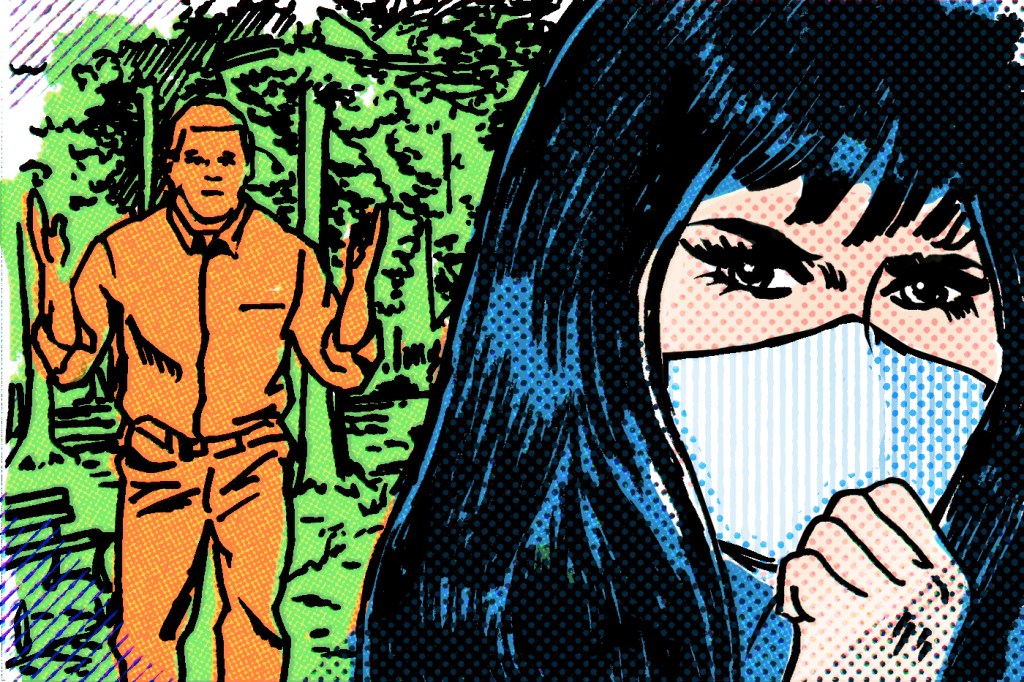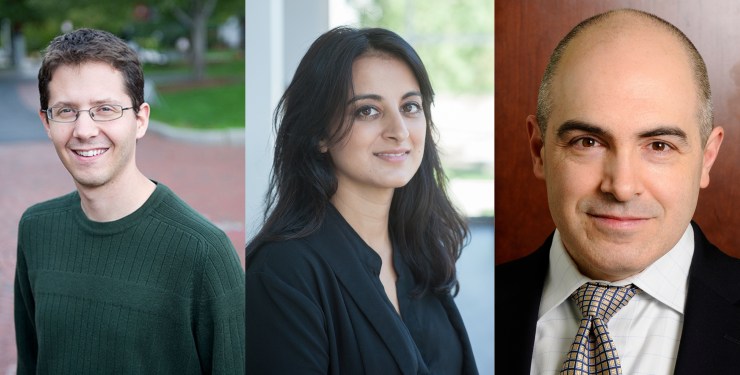The person walking past you isn’t wearing a mask. What should you say?

You know the feeling. You can’t possibly know why people aren’t wearing masks. They might have a health condition that makes it hard to breathe. Maybe they’re afraid of being racially profiled. Still, there’s tension when you see an uncovered face in public.
That tension is splitting people into different camps. Some people don their masks religiously. Others are choosing to defy the recommendations from public health experts to slow the transmission of SARS-CoV-2, the coronavirus responsible for the COVID-19 pandemic.
So, when you spot a person going maskless in public, should you call them out? If you don’t, are you not doing enough to help protect people who are at higher risk of developing serious complications if they contract COVID-19?
It’s hard to imagine that many people are actively trying to put others at risk, says Aziza Ahmed, a law professor who specializes in health law at Northeastern. That’s why everyone should approach the situation with sensitivity, she says. If people who are not wearing masks are standing close to each other and don’t look like they’re family, is it possible that they are living together?
“We have to be sensitive to the fact that we don’t actually know why they might not be following public health guidance,” Ahmed says. “You just might have to leave or separate yourself, and I think it’s becoming increasingly acceptable to say things like, ‘please stand back,’ ‘please stand away from me.’”

Rory Smead is an associate professor of philosophy and the Ronald L. and Linda A. Rossetti professor for the humanities in the College of Social Sciences and Humanities. Aziza Ahmed is a professor in the School of Law. David DeSteno, is a professor of psychology in the College of Science. Courtesy photos.
Another way to handle that conundrum is to offer subtle encouragement for the behaviors we want to foster, says David DeSteno, a professor of psychology. At Northeastern, DeSteno studies how people’s emotions shape decisions and behaviors that foster wellbeing.
People’s concerns about masks aren’t unwarranted. Researchers are determining the specifics about how long SARS-CoV-2 particles can stay airborne, and how far they can travel when they are expelled from the body. The details of how and when an asymptomatic person spreads the viral particles are still being investigated, too.
Public health authorities have recommended that everyone cover their face in public to slow the spread of the coronavirus, and to do it right: with a snug fit that covers the mouth and nose. Several U.S. states have put new laws into effect to encourage people to wear masks.
DeSteno says that instead of confronting people for going against public health guidelines, it might be more fruitful to have a conversation that emphasizes how wearing a mask could help protect others at risk, and not just oneself.
Seeing other people engage in behaviors that might be harmful to others could evoke anger and frustration. But even when those feelings might compel people to turn into mask vigilantes, it’s best to focus on how those behaviors can help protect people who are more likely to develop complications. Don’t approach an uncovered face with hostility, DeSteno says.
“The initial research we’re seeing on persuading people to ‘socially distance’ suggests that messages framed in that way tend to be the most effective,” he says. “Coming at them in a very angry and shaming way is going to get their back up against the wall and make them not want to comply.”
For people who might want to avoid confrontations, DeSteno recommends encouraging other behavior with small acts. That can be done simply by saying or gesturing thanks to people who are wearing masks. It’s a matter of modeling and cultivating that behavior, he says.
“What you are doing is reinforcing that norm,” DeSteno says. “Once we can show that there’s a reward for that, the idea begins to spread within the populace.”
Rory Smead, an associate professor of philosophy and the Ronald L. and Linda A. Rossetti professor for the humanities at Northeastern, considers the mask dilemma an example of the kind of problem he thinks about every day. His work on mathematical models of the social behavior of animals (and non-animals, such as bacteria) focuses on the ethical implications of altruism and spite.
Recently, Smead went out for a hike at Borderland State Park, just outside of Boston. The mask that covered his face made it difficult to breathe and smell the woods. As he walked outdoors, a new ordinance was coming into effect in Massachusetts that would require everyone to wear a mask.
“I certainly make a mental note when I feel like people are not doing the socially responsible thing,” he says. “If they’re being a little too cavalier.”
In the models, as in during the pandemic, two elements that affect how people decide to act include social dilemmas and conventions, Smead says.
A social dilemma is any situation in which what’s best for everybody collectively is costly to an individual. It involves a misalignment of interests, Smead says. The benefits of wearing a mask are distributed among others—especially if the wearer of the mask is asymptomatic. These benefits include things that might not be immediately obvious to an individual, such as not overtaxing the healthcare system.
“It’s not unlike some of the other problems that we have, with pollution more generally, or carbon emissions,” Smead says. “It’s costly for me to cut them, and I see none of the benefits when I do it, but the benefits are this diffused thing that everybody gets.”
Social conventions can also complicate how to approach the mask dilemma. Stepping out of what people perceive as normal can be awkward. And, however tactfully it is done, calling out people for not wearing a mask can feel like not sticking to social niceties. Especially in the United States, Smead says, people value the idea of respecting other people’s choices.
“I’m constantly struck by the disconnect there,” Smead says, “where I make a certain judgment in my head, but there are certainly psychological forces that have to do with the sort of social niceties and conventions that usually prevent me from saying anything.”
Still, even if it feels like you’re not respecting others, it might be worth it to endure that interaction.
“It can be a matter of public health,” Smead says. “So it might be important to not necessarily respect other’s decisions because [they] affect you and your health.”
For media inquiries, please contact media@northeastern.edu.





